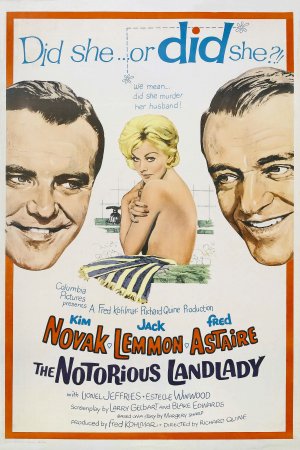
THE NOTORIOUS LANDLADY
US, 1962, 123 minutes, Black and white.
Kim Novak, Jack Lemmon, Fred Astaire, Lionel Jeffries, Estelle Winwood, Maxwell Reed, Henry Daniell.
Directed by Richard Quine.
The Notorious Landlady is a very entertaining film. It has a London setting – Americans abroad. Kim Novak has a boarding house and rents out a room to a young diplomat played by Jack Lemmon. Since the lady has a reputation for having murdered her husband, the ambassador, Fred Astaire, takes a dim view. However, he too comes under the spell of the notorious landlady. Lionel Jeffries is the Scotland Yard inspector pursuing the case.
The film is very witty, especially since it was written by Larry Gelbart, prolific writer of comedy including M*A*S*H, and Blake Edwards, responsible for the Pink Panther films amongst many others. The film was directed by Richard Quine who directed a number of films with both Lemmon and Novak including Bell, Book and Candle and, with Kim Novak, Pushover, Strangers When We Meet, and with Jack Lemmon, How to Murder Your Wife.
The film is a very pleasing combination of comedy, investigation, thriller, murder mystery – with some fine scenes to the music of Gilbert and Sullivan.
1. How amusing a comedy was this? Why? The amusing title, the situations and dialogue, characters? Was it enjoyable also as a murder mystery? Why? How original was it or did it use old fashioned conventions well?
2. An ordinary kind of entertainment? Did it have any value besides sheer entertainment?
3. Were the persons in the film characters or merely personalities? The main cast? The conventional characters, ladies peering in windows, old ladies, mysterious strangers? Comment on the attitudes behind such a film, conventional characters for a murder mystery, exaggerations to make points? Was this all effectively done?
4. Comment on the theme of 'America versus England'. The presentation of England and the atmosphere of London, the details of London life, notorious landladies and Cockneys, the dark atmosphere of London, the police? How does an American, blustering into this atmosphere make out? American naivety versus English 'know-how'?
5. How did the film present the theme of appearances and reality? The contrived appearances to make Mrs Hardwicke look suspicious, arsenic, bodies, her reputation? Did it ever seem that Kim Novak could be a suspicious murderess? What of appearances and reality as regards Mrs Brown?
6. Was Carly Hardwicke an attractive heroine? Her first appearance as a Cockney, her revelation of herself to Billy, her suspicious motivations in what she had done? Her telling of the truth? Bill's fear that she might be murdering him? Her behaviour at the trial, her vindication? Was she credible? How well could the audience identify with her plight?
7. Did Jack Lemmon make Bill an attractive hero? His earnest naivety? Flat-searching, encounter with Mrs Hardwicke, his taking up her cause, being warned by Ambruster, still pursuing the murderer, getting involved in fires etc., publicity in the papers, risking his job? His pursuit of the truth? How enjoyable a performance was this?
8. Was Ambruster an interesting character? Fred Astaire's dry performance? Representing American authority, the satire on American authorities, his infatuation with Mrs Hardwicke, his support of her?
9. How enjoyable was the presentation of Scotland Yard and the English police? Inspector Oliphant and the comedy?
10. Did the film become serious in the flashbacks to showing Hardwicke and his death? The involvement in the criminal atmosphere of the film? Or was this part and parcel of the whole film's atmosphere?
11. The preparation for Mrs Brown as a blackmailer? Mrs Dunhill and her telling what she saw? The ugliness of Mrs Brown as a villain? Her shrewdness? How did this add to the surprise and the suspense of the film?
12. The significance of the court-case and its emotional impact at that stage of the film? The surprise of Mrs Brown's testimony? The possibilities for a solution?
13. The finale of the film has been commented on by critics as most successful, the chase in the wheelchair and the music of Gilbert and Sullivan. Why was this enjoyable? How successfully filmed?